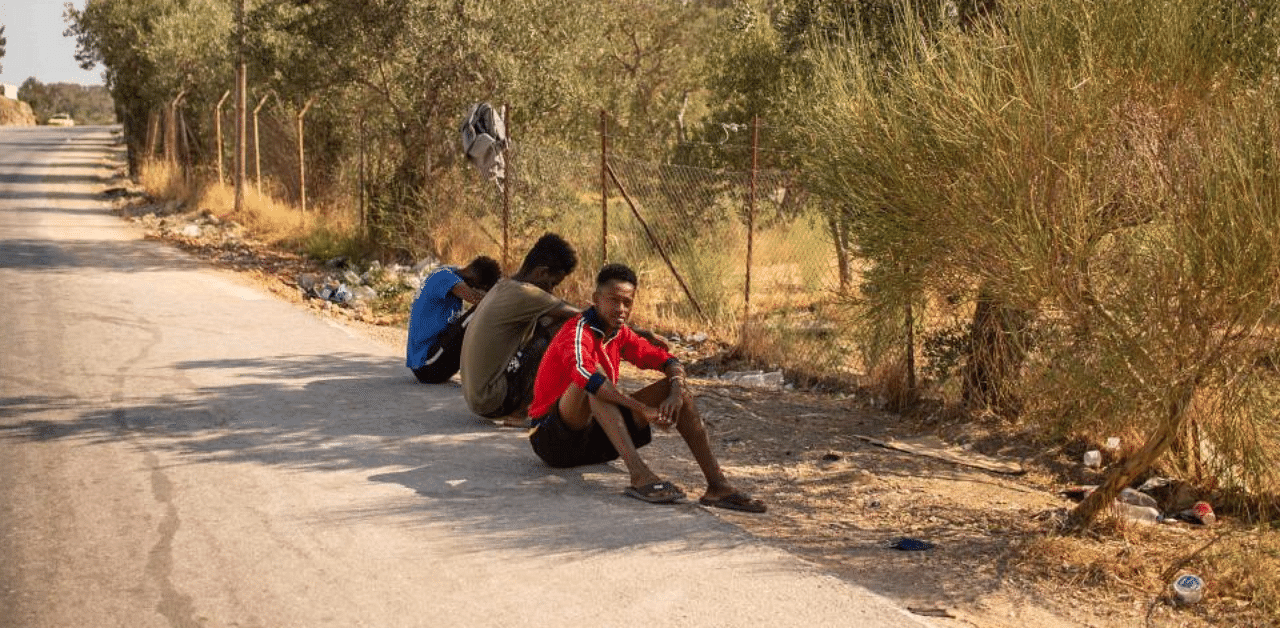
Greece said Sunday it hoped thousands of asylum seekers left homeless by fires at Europe's largest migrant camp could be rehoused within a week to end a crisis that has seen protesters clash with police.
Asylum-seekers -- including the elderly and very young children -- have been sleeping rough on Lesbos island since Wednesday when some 11,000 fled the overcrowded Moria camp after it was gutted in apparent arson attacks.
Clashes occurred on Saturday after hundreds of migrants staged a generally peaceful demonstration. Some young men started throwing stones at riot police who responded with tear gas.
Migrants demonstrated again peacefully on Sunday morning, an AFP reporter said.
Authorities have now set up a new 3,000-capacity camp at Kara Tepe, a few kilometres (miles) from the destroyed Moria camp, regularly criticised by the UN and rights groups for overcrowding and dismal sanitary conditions.
"This is a decent provisional structure that will give us the chance to handle the situation until the next stage", Prime Minister Kyriakos Mitsotakis said Sunday.
A new permanent reception and registration centre for asylum seekers would avoid "the problems of Moria", he added.
Migration Ministry officials said on Saturday that the plan was to eventually provide tents for all the homeless and accelerate the asylum procedure, with minister Notis Mitarachi saying it would take "five days" to get everyone inside.
But while around 500 migrants had entered Kara Tepe by Sunday afternoon, with more in queues outside, many others remained on the road, hesitant or outright refusing to go in.
"In Moria we could come and go but here, (the new camp) will be like a prison", Zola, a Congolese mother of a five-month-old child, told AFP.
One Congolese migrant inside Kara Tepe also told AFP by text message that police would not allow them to leave.
Police said some Afghan migrants were trying to dissuade others from entering the new camp to access food and shelter.
AFP reporters said that police had barred the Afghans from approaching the new camp and the migrants camping on the road, and police minister Michalis Chrisochoidis promised "sanctions" against anyone trying to block access.
"Thousands" of officers have been brought to the island "to protect the life and security" of both locals and asylum seekers, Chrisochoidis said.
"We will allow nobody to violate the rules of our country," he added.
A migration ministry spokesman said the most vulnerable asylum-seekers would be the first to be housed.
"We will give priority to families. It will be tents of six and the camp will be separated by ethnicities," Alexandros Ragavas told AFP.
"We think that the asylum seekers will be finally convinced to enter of their own free will", migration minister Mitarachi said.
Greek authorities are stepping up efforts to gather refugees in the camp in order to restore order on the island but also over fears the coronavirus could spread.
Just before the blazes that burned down the Moria camp, 35 people tested positive for Covid-19 and were facing isolation measures.
On Sunday, authorities said that seven migrants among those entering the new camp were positive for coronavirus.
"There might be 200 cases of coronavirus by now in those that fled Moria", Mitarachi said Sunday.
The combination of coronavirus with the migration issue makes for an "explosive mix", Mitsotakis said Saturday in a speech in the northern city of Thessaloniki.
The prime minister said Sunday that there was no doubt "overactive" migrants trying to force the government to move them off Lesbos had started the fires in Moria.
The plight of the stranded families has prompted other European countries to offer to take in hundreds of asylum-seekers, particularly unaccompanied youngsters.
"We are in contact with the German Chancellor, Mrs Merkel, to see how Germany can support us more by taking in families that have been granted asylum," Mitsotakis said.
But Greece has long complained that, aside from providing funds, its EU partners have done too little to help.
"We can't fail a second time as Europe in handling the migrant crisis", Mitsotakis said.
Past efforts to create a quota system, in which all European countries would have agreed to take in refugees from Greece, foundered on opposition from right-wing populist governments such as those in Poland and Hungary.
Pope Francis, who visited Lesbos in 2016, on Sunday urged "a human reception for the migrants, for the refugees, for the asylum seekers in Europe", expressing his solidarity with the victims.